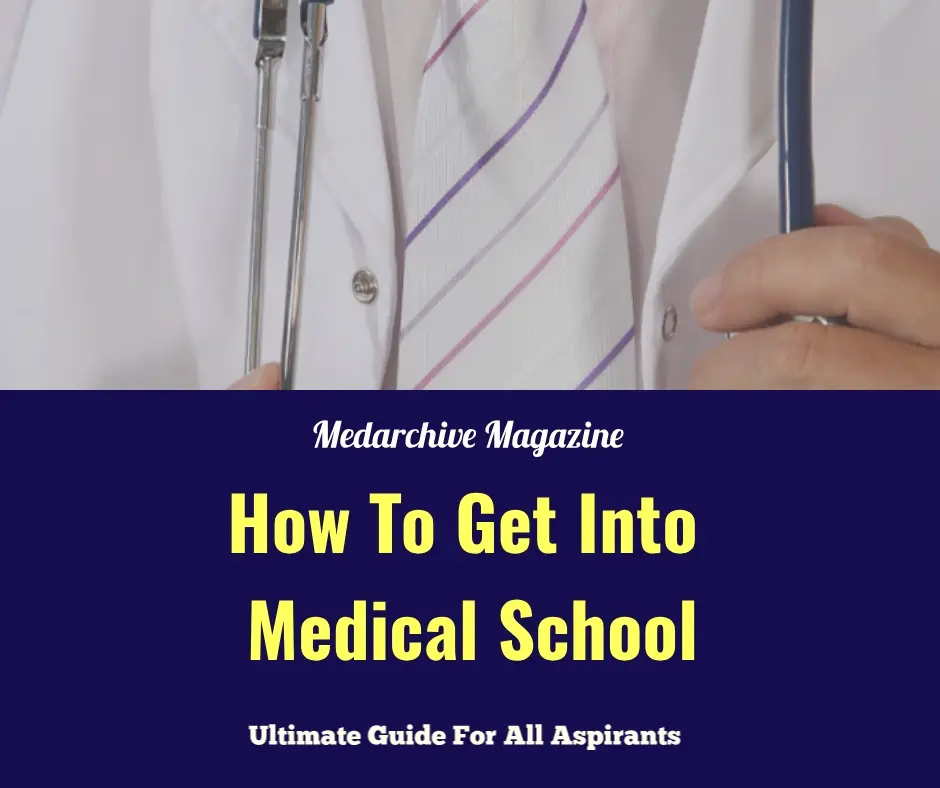Getting into medical school is no longer as easy and straightforward as it used to be. In the past, say 30 to 50 years ago, once you are smart enough to get a very high score in your entrance exams, then you have a high chance of being accepted into medical school.
But in recent times, due to the number of persons trooping into medical school, the standards of acceptance are becoming stricter and the admission portals for many medical schools are tightening up. That if you want to study medicine, you have to be exceptional in order to stand out in the admission process.
And most of the time most persons who are able to break through the barriers of the medical school admission process are usually current degree holders or secondary school graduates who have scores above the 97th percentile in both their secondary school certificate exams and their medical entrance exams.
If you are reading this post, you most likely belong to any of the following categories; a fresh high school graduate, a degree holder, a parent, or a guardian who is looking for the best advice on how to get into a medical school for yourself or for your wards who wants to pursue an MBBS (MD) degree.
Whichever one you are, the following are the best tips on how to get into a medical school of your choice:
Table of Contents
- General Tips On How To Get Into A Medical School (Globally)
- It All Starts With Your Performance In High School
- You Need A Mentor
- Research Your Preferred Institution
- Understand that medicine is currently more competitive than before
- Start Studying Early For Medical School Admission Exams
- Apply to multiple medical schools
- Get acquainted with the medical school requirements
- Research your medical school application deadlines
- Start Building Your Medical Experience
- Choose an undergraduate program you love
- Make Your Medical School Personal Statement Compelling
- Try to distinguish yourself in interviews
- How to get into medical school with low GPA
- Tips if you want to study medicine abroad
- Final Words On How To Get Into A Medical School

General Tips On How To Get Into A Medical School (Globally)

- Get good grades in your high school diploma, A levels, GCSE or SSCE
- You Need A Mentor
- Research Your Preferred Institution
- Understand that medicine is currently more competitive than before
- Start Studying Early
- Apply to multiple medical schools
- Get Acquainted with the medical school requirements
- Research your medical school application deadlines
- Start Building Your Medical Experience
- Choose an undergraduate program you love
- Get a good CGPA in your university program
- Make Sure You Score High In Your Entrance Exams
- Make Your Medical School Personal Statement Compelling
- Try to distinguish yourself in interviews
- Be ready to explain why you want to be a doctor
- How to get into a medical school with low GPA
- If you want to study medicine abroad
- Spend time on blogs for medical students
- Get connected
- What if you don’t get accepted?
It All Starts With Your Performance In High School
Statistically speaking, the best time to enter medical school is just after high school. But the problem with getting admission immediately after high school is that it is very competitive such that you need very good grades to be able to stand out.
Another thing is the lack of experience to boost your CV and increase your chances of being accepted.
The best time to start planning on how to get into a medical school is from your 8th and 9th grades. This is bearing in mind that simply having excellent grades is not all you need to be accepted into med school. There are some students who have average grades in high school but ended up getting into medical school just because of their profile in other extra-curricular activities like research and active volunteer work.
As you pursue good grades in your 8th and 9th grades, you should as well look out for research and volunteer positions. Also, from now you can start preparing for SAT and ACT. If you are really determined to pursue a career in medicine at this point, then by the end of freshman year you will have known if you should keep pursuing your MD career.
If in the end, you finally decide to pursue a career in the medical profession, then you must know that it is high time you buckled up and get more serious. You must wear discipline like a garment, and be time conscious. By now, you must have analyzed how you will spend the rest of your days in high school. Furthermore, of all the courses you will offer in senior high school, ensure to include the three core science subjects:
- Physics
- Chemistry and
- Biology.
Are you already preparing for the SAT? Checkout the Kaplan SAT Prep Course Reviews
You Need A Mentor
Relevant studies have revealed that mentorship is an effective supportive framework for the transfer of learning needed to address the gap in knowledge on how to get into a medical school without any hassles. Having a mentor, especially someone who is currently in medical school, or even a doctor will give you an unfair advantage that your colleagues who are working through this alone don’t have.
Mentorship gives you the confidence to prepare for your entrance exams and also reveals to you the necessary things that medical schools are looking for to guide your preparation. This will be most beneficial for first-generation medical school aspirants. That is those medical school aspirants who are the first in their families to attend medical school. But if you are lucky enough to already have someone in the medical field, then this person can serve as a mentor and will guide you through essential decisions while applying for medical school.
The best simplest way to get a mentor is to find someone who is already a medical student and ask them for help. Or you can join any of the online forums and communities for medical school aspirants. At Medarchive Magazine, we have such a group for medical aspirants, premeds, and clinical medical students. In this community, you can ask questions and get answers whenever you need help and clarifications about anything during your medical school application process. You can join our Whatsapp group for premeds on this page.
Research Your Preferred Institution
This is where it all gets serious! You are now preparing for your entrance exams and looking for the best medical school to enter. The best approach to adopt is to use here is to develop criteria that you will use in eliminating different medical schools and selecting the more suitable ones. We already have a set of guidelines that you can use in selecting a medical school.
Things to look out for while choosing a medical school to apply for:
- Is the medical school fully accredited by your country’s university commission?
- What is the school’s cut-off mark for admission?
- Considering the cost of school fees
- Where is the medical school located?
- What is the overall cost of living where the med school is sited?
- How many years program will you get your MBBS degree in the school?
- While analyzing the answers to the above questions, there are a few things you must bear in mind:
- Most Federal Universities have full accreditation
- It is a general rule that private universities are more expensive than federal government universities, followed by state universities
- Most persons prefer schools that are closer to home
- Cost of living is usually higher in more urbanized regions of a country
- Find out how long medical school is in the US, UK, Canada and Australia.
Understand that medicine is currently more competitive than before
By now you should be certain of the medical schools you want to apply to and have made a list of your favorites among them. Here is where most medical aspirants get it wrong; “you must not study in Havard, Hopkins or other top medical schools to be a good doctor”. There are many other excellent medical schools around you can apply to. Besides, in the end, we all are going to be called doctors someday and there will be no difference between the Havard graduate and the doctor from the medical school downtown.
In fact, the competition for the top medical schools is usually terrific and your chances of being accepted are lean due to high competition. Remember that other ambitious people like you also want to be called Havard graduates 4 to 5 years from now. To increase your chances of getting into medical school in the midst of this cut-throat competition, you need to adopt what I call the best medical school application practices.
So here are the best medical school application practices:
- Apply to as many medical schools as possible
- If you can afford to, apply to private universities; their acceptance rates are higher
- Utilize your connections
- Build an enviable CV
Start Studying Early For Medical School Admission Exams
The Medical College Admission Test (MCAT) is a standardized multiple-choice assessment formulated by the Association of American Medical Colleges (AAMC). MCAT is one of the medical school requirements in the United States, Canada, Australia, and other 15 countries in the Caribbean Islands for admission of aspiring medical students. In some other countries, it is the Unified Tertiary Matriculation Exam (UTME) and Screening exams. All these are the medical school entrance exams.
The MCAT is a computer-based test written about 25 times a year usually from January to September. The exam tests your competency in the physical sciences, biological sciences, and verbal reasoning. It cannot be taken more than three (3) times in a year, four (4) times in a 2 year period, and seven (7) times for life. So this means that you just have 7 attempts to pass your MCAT exam. And for every MCAT you write, there is an exam fee always attached.
So if you will ace your MACT at once, then you must cultivate the habit of self-discipline and start preparing on time. You should join both physical and online study groups, and even attend tutorials when you can. This will expose you to lots of study materials that may be vital in your preparation. Also, never underestimate the usefulness of past question papers while preparing for any medical school entrance exam. Chances that the exam body will repeat similar questions they have set in the past are very high.
Also, Read: Kaplan MCAT Prep Course Reviews
Apply to multiple medical schools
Yes, I am emphasizing this again; do not put all your eggs in one basket. Even if you gained nothing at all from reading this post, at least go home with this one thing; apply to as many good medical schools as possible. But if you get lucky enough to get accepted into your medical school of choice after your initial applications, then that’s awesome! But do not allow one medical school to destroy your hope of studying your dream course.
Get acquainted with the medical school requirements
The next important point on how to get into a medical school is to find out the answer to the question; what does medical school look for? Different universities have their own medical school requirements.
But above all you should understand that medical schools are generally looking for students with:
- Excellent high school grades with a minimum of credit in physics, chemistry, and biology.
- Good TOEFL language scores for international students in the US
- High MCAT score
- Cumulative Grade Point Average (CGPA) above 3.5 for aspirants with a first degree
- A little experience in research
- A good volunteer experience
- Experience in other extra-curricular activities like language learning, music and arts
- A catchy medical school personal statement
- A good recommendation letter
- Confidence and politeness during interviews
If there are any other special medical school requirements that may be specific to your school of choice, then you should not hesitate to ask your mentors for advice and to ask questions about them in forums.
Research your medical school application deadlines
Now you are getting closer to the real deal. After you have understood all the medical school requirements for your school, the next step is to be aware of the application deadlines of your medical school of choice. It is best to follow the school blog or website if they have any to get notified when they release any new updates concerning the admission process. Another good practice is to bookmark these dates and set reminders on your smartphone calendars. You can as well write down the deadlines on paper and paste them where you can easily see them daily.
The idea is not to submit your applications on the deadline but to submit them as early as possible like weeks before the deadline. It could score you little points during your physical interview.
Start Building Your Medical Experience
This tip should come way up this list. From your high school days when you must have developed an interest in pursuing a medical career, you should start engaging in certain activities to build your experience in the medical field.
Now this will be very stressful, time-consuming, and even expensive for you, but it will go a long way to build your CV, help you learn valuable skills, and help acquire knowledge that will be beneficial to you in the future. Some of the best ways to build your medical experience include:
- Being a volunteer in a hospital or health clinic: This is one of the best ways to build your medical experience. Some of the roles you can play as a volunteer in a hospital are customer service to patients and patients’ relatives, paperwork, answering phone calls, etc. To land yourself a volunteer opportunity, you should visit the websites of the hospitals near your where you would like to volunteer, locate their volunteer page, and register. If you already have a mentor, they can also be of good help in helping you secure a volunteer position.
- Apply for research program: There are many colleges that offer internship and research programs for high school students. Most of these programs are usually during summer breaks and the experience you will gain will vary including job shadowing and hands-on acquisition of skills.
- Volunteer at a nursing home: A cool way to get an easy volunteer opportunity is to apply to a nursing home or a homeless shelter. These ones are usually not as competitive as the volunteer work in hospitals and health clinics and can be a great boost to your CV.
Choose an undergraduate program you love
If you would like to first complete an undergraduate program and get a degree before applying to med school, then you must choose an undergraduate program you love. But always try to choose health and science-related course as majors. Common undergraduate programs people choose include:
- Human physiology
- Psychology
- Human anatomy
- Biochemistry
- Nursing
- Physiotherapy
- Med lab technology
- Biomedical engineering
- Economics
- English and literary studies
Most of all, try and get a good CGPA. Most medical schools do not accept CGPA’s less than 3.5. and of course, the higher the better.
Make Your Medical School Personal Statement Compelling
Another important thing schools look out for in admitting medical students is how compelling their medical school personal statement is. Your medical school personal statement is your strongest argument to back up why you should be admitted into a medical school. Therefore, you should make it count.
To stand out in your medical school personal statement, it is best to steer off the cliche. Keep in mind that those admission officers are doctors, and they must have gone through lots of medical school personal statements for different applicants and they know what makes one stand out from the other.
Here are the best tips for a compelling medical school personal statement:
- Write and re-write it as much as possible till you get a perfect draft.
- Be personal and specific
- Stick to the theme. Don’t tell them the story of your life
- Come from a unique angle
- Start your first paragraph with a hook; something to keep them reading
- The first rule of creative writing: show don’t tell
- Deploy the 5-point essay structure:
- Introduction
- 3-4 paragraphs for the body of the essay
- A final or concluding paragraph
- Be simple and straightforward
- Watch your word count; don’t to exceed the required
- Don’t overdo
- Ask for expert’s opinions
- Cross check all details
Examples of titles you can choose from include:
- Your reasons and motivation to pursue a medical career
- A tough personal experience and how it inspired you
- An experience that modified your view about medicine
- Stories of hardships, obstacles, and challenges that may have influenced your educational pursuit
- A relationship with a mentor or another inspiring individual
DON’T: Write about how medicine is your passion or your dream course of study. A lot of people have already written that, and remember, you are trying to stand out.
Try to distinguish yourself in interviews
Here we have reached the talking part and the most dreaded for many aspirants. This is because you have to face the admission panel yourself and convince them on why they should accept you into their medical school. This is not meant to be difficult if you try not to impress anyone and be yourself. Sorry, if you are the shy type who does not like speaking in front of strangers, you have to practice and practice till you become better at being yourself and telling your story.
Common interview questions you should be expecting include:
- Tell me about yourself or Can we meet you?
- Describe your background
- What were your major pursuits in high school?
- Highlight the extra-curricular activities you took part in?
- What can you tell me about your work experiences before medical school?
- Describe your present day self and future goals
- What are your hobbies
- Tell me about your experience as a volunteer
- Why do you want to be a doctor?
One other solid point you should note during interviews is that you should never lie. Always be yourself and say the truth no matter how hard it may sound. If you need a short guide for preparing for interviews, you can get one below:
How to get into medical school with low GPA
So you are finished with your undergraduate program but ended up with a low CGPA and are looking for tips on how to get into a medical school? Well, the good news is that in the past, there have been success stories from people who finished with low CGPA and even a poor MCAT and are currently in med school today. So the question is how did were they able to do this?
Before them, you should note that most medical schools have the average CGPA cut-off mark at around 3.7 to 3.9. But sometimes, you can few a few medical schools whose cut-off is as low as 2.9. I know you might be itching to find out those schools that can accept students with low CGPA. But here is my advice; never rule out your chances of being accepted into a medical school based on CGPA alone. There are lots of other things you can do to get accepted even if you have a low CGPA.
Here is how you can get into medical school with low CGPA
Do a Postbaccalaureate program (Postbac):
Postbacs are special programs reserved for students who want to pursue a second degree. This means that such students must have completed their first undergraduate degree but would like to pursue another career in medicine. The role of a postbac in increasing your chances of getting into medical school with a low GPA is that if you are able to have better grades, it could be a boost in your CV.
Perform excellently in MCAT:
Getting a high MCAT score will show your intellectual prowess and compensate for your low CGPA.
Boost your CV with enough clinical experience:
Another way to enter med school with a low CGPA is to acquire much more experience in research and active volunteerism. You have to make this section of your CV stand out because this is what will make the admission board choose you over others with a better CGPA.
Make your personal statement stand out:
We are still talking about how to get into med school with a low CGPA. Remember that the point is to compensate for your low CGPA. So even if you can hire experts to give you a good personal statement, it would be worth it. Or better still, if you can write a compelling statement, that’s okay.
Use your connection:
If you know influential people in the medical school you wish you enter, they could help work your way into medical school even with your low MCAT through recommendation. But such connections are not usually easy to come by. But if you have people, why not use them?
Also, Read; 10 Best Medical Schools For Older Students
Tips if you want to study medicine abroad

If you are an international student looking for countries to study medicine abroad, then your work will definitely be more.
First, you will have to find out the universities that accept international students who study their medical school requirements and start working towards building your CV to meet their standards.
Don does not forget that you may need to write and pass an English Language Standardization Test; IELTS exam or TOEFL to migrate.
Here Is A List Of Universities That Accept International Students In The United States:

- Albert Einstein College of Medicine of Yeshiva University
- Alpert Medical School at Brown University
- Boston University School of Medicine
- Case Western Reserve University School of Medicine
- Chicago Medical School at Rosalind Franklin University of Medicine and Science
- Columbia University College of Physicians and Surgeons
- Creighton University School of Medicine
- Duke University School of Medicine
- Emory University School of Medicine
- Geisel School of Medicine at Dartmouth
- Georgetown University School of Medicine
- George Washington University School of Medicine and Health Sciences
- Harvard Medical School
- Howard University College of Medicine
- Icahn School of Medicine at Mount Sinai
- Johns Hopkins University School of Medicine
- Kimmel Medical College at Thomas Jefferson University
- Loma Linda University School of Medicine
- Mayo Medical School
- Medical College of Wisconsin
- Michigan State University College of Human Medicine
- New York Medical College
- Northwestern University Feinberg School of Medicine
- Oakland University School of Medicine
- Pennsylvania State University College of Medicine
- Perelman School of Medicine at the University of Pennsylvania
- Rutgers Johnson Medical School
- Stanford University School of Medicine
- State University of New York Upstate Medical University
- Stony Brook University School of Medicine
- Tulane University School of Medicine
- University of California Davis School of Medicine
- University of California Los Angeles Geffen School of Medicine
- University of Chicago Pritzker School of Medicine
- University of Connecticut School of Medicine
- University of Hawaii John A. Burns School of Medicine
- University of Kentucky College of Medicine
- University of Maryland School of Medicine
- University of Pittsburgh School of Medicine
- University of Rochester School of Medicine and Dentistry
- University of Utah School of Medicine
- University of Virginia School of Medicine
- Vanderbilt School of Medicine
- Washington University in St. Louis School of Medicine
- Wayne State University School of Medicine
- Weill Cornell Medical College
- West Virginia University School of Medicine
- Yale School of Medicine
Spend time on blogs for medical students
Information is power. As a medical school aspirant, you should start identifying with medical school blogs like this one where helpful tips are being shared to help aspiring medics and also medical students. Being part of a blog community for medical students exposes you to lots of information and resources that will help you in your medical career.
We have outlined the best blogs for medical students which you are recommended to follow in a separate post. You should go through them and find out which ones you relate with mostly. Also, remember that while selecting medical school blogs to follow, always look out for those ones that share content about medical school in your country of residence.
Getting Into Medical School: Stay connected
The importance of connection in getting into medical school can not be over-emphasized. By connection, we actually mean the people you know especially the influential ones. Good connections can break many barriers for you.
For instance, if you have a low CGPA or very poor MCAT scores, your last-ditch stance will be to rely on the influential people you know to help you secure admission into medical school.
What if you don’t get accepted?
If you follow all these tips on how to get into a medical school, the chances that any medical school will reject you are very lean.
But in case you are so unfortunate to be rejected by all the medical schools you applied to, here are a couple of things you can try out.
- Get a better score for your MCAT
- Look for more volunteer opportunities
- Carry out more research
- Revamp your CV
- Write a better personal statement and apply again till you get accepted
Or
- Pursue an undergraduate program and get your first degree if you have not. Then, come back and pursue your medical dream if it is still alive.
- If you finish your undergraduate program and your passion for medicine is no longer there, then you can pursue your other dreams from there.
Final Words On How To Get Into A Medical School
The journey into medical school is a tough one. But that is just the beginning compared to the hurdles when you finally get into medical school. But one good thing to note is that the journey is not for the strong or the weak, but for those who are patient enough to nurse their dreams till it comes to fruition.
Kindly leave a comment below if you have a question, or if there is a concept you do not clearly understand. Do not forget to like, share and subscribe to the notification of this blog for more helpful tips. I also recommend you join our special WhatsApp group for medical school aspirants. I wish you the best in your journey into medical school.
Other Posts You May Like:
25 Things You Need To Buy FOr Medical School
Medical School Application Headshots: Is A Professional Headshot Worth It?
15 Helpful Tips for First Year Medical Students




